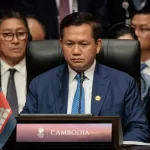European Parliament Motion Gives Roadmap For Dealing With Rogue Cambodian State
- admin
- 0 Comments
The Khmer Movement for Democracy (KMD) welcomes a resolution by the European Parliament calling for long-overdue European action against the family dictatorship in Cambodia.
The text, adopted on 28 November, calls on the EU Commission and member states to assess changes to tariff preferences under the Everything but Arms scheme in light of Cambodia’s human rights record. The EU Commission had already in 2020 withdrawn part of Cambodia’s EBA access to European markets.
JosepBorrell, then vice-president of the European Commission, said in 2020 that the “duration, scale and impact of Cambodia’s violations of the rights to political participation and to the freedoms of expression and association left the European Union with no other choice than to partially withdraw trade preferences. The European Union will not stand and watch as democracy is eroded, human rights curtailed, and free debate silenced.”
Cambodia’s record of repression has continuously worsened since Borrell’s assessment. The national election of 2023 mirrored that of 2018 in being held in the absence of any recognised opposition party. Arbitrary arrests and convictions of government critics have accelerated under Hun Manet, who took over as prime minister from his father Hun Sen in August 2023.
The KMD operates in the global Cambodian diaspora. Opposing the government from inside Cambodia is currently impossible. Amnesty International counted 94 arrests of critics of a regional development plan between late July and late August 2024. The development plan has now been abandoned by the government, but the critics remain in prison. In July, a group of young activists from the Mother Nature Cambodia group were imprisoned after their internationally acclaimed work in exposing environmental abuses.
The new European Parliament motion calls for targeted sanctions against those responsible for political repression, and for pressure to be exerted on the Cambodian government until all political prisoners are released.
Transnational repression has intensified since 2020, with the forced deportation of Cambodian opposition supporters from Thailand who are now in Cambodian prisons and facing charges of treason. In France Sorn Dara, a political refugee, has seen his father in Cambodia arrested on a fabricated charge in an attempt to silence his son’s criticism of the regime.
On the orders of Hun Sen, the government is drafting legislation against terrorism, specifically targeting the long-time, peaceful exiled opposition leader Sam Rainsy, who has launched a movement of national resistance.
The European Parliament motion highlights the case of the harassment by the Cambodia government of the Center for Alliance of Labor and Human Rights (CENTRAL). In June 2024, CENTRAL published a report which criticised the Better Factories Cambodia programme by the International Labour Organisation (ILO) and the International Finance Corporation (IFC).
The ILO and IFC are both clear that civil society should be allowed to discuss and criticize their work, which is an essential part of developing better practice. That’s not how the Cambodian government operates. The government responded to CENTRAL’s criticism by saying that it would launch a “national security audit” of the NGO. This has come alongside harassment of CENTRAL’s members and protests by government-aligned trade unions outside CENTRAL’s offices. The harassment has been condemned by the UN special rapporteur on human rights in Cambodia.
Cambodia’s slide into dictatorship is a violation of the 1991 international treaty, the Paris Peace Agreements on Cambodia, which ended more than a decade of conflict. The agreements lay down a system of multi-party democracy and regular free and fair elections. Cambodians who took those prescriptions seriously now languish in tiny, packed prison cells. The human cost of international inaction on Cambodia’s political prisoners has never been higher.
Please find the PDF file by clicking on this link

